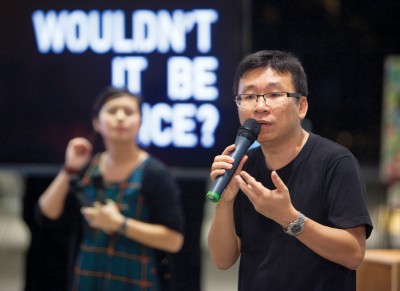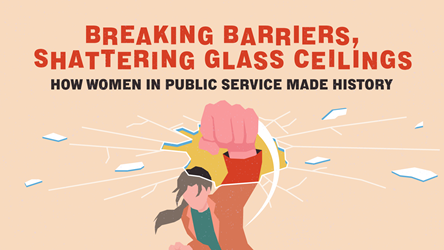Discussing Singapore's Future, Through Art

Pro-Singapore, Pro-Singaporean or Pro-Active: which future do you want for the country in 2022?
This was the important yet difficult question that think-tank Institute of Policy Studies (IPS) posed to members of the public at its week-long Prism event in November last year.
Held at the National Library, Prism was a scenario-planning exercise to engage the masses, through the arts, to think about governance and how they can actively create a future they want.
Earlier in the year, the institute came up with the three scenarios through a series of workshops with a diverse range of participants. (See Prism Scenarios.)
Prism Scenarios
Pro-Singapore: “SingaStore.com” describes a pro-business, high-growth Singapore where the public trusts the government that emphasises creating economic value.
Pro-Singaporean: “SingaGives.gov” features a more egalitarian society. Pro-social values like solidarity and human development are prioritised, resulting in a low but inclusive economic growth.
Pro-Active: “WikiCity.sg” has a weak coalition government ruling. The citizens drive the country, adopting a proactive stance towards governance.

Dr Gillian Koh, a senior research fellow at IPS and the principal investigator behind the Prism project, said: “We show different models of governance in the scenarios, and they are pretty controversial. There is not one that is utopian or dystopian, each has good and bad, and highlights the choices we face.”
The scenarios are meant to provoke thought and discussion. At Prism, they were intepreted by theatre company Drama Box through an immersive arts experience. It used a melange of multimedia installations, exhibits and forum theatre to transport visitors to the year 2022.
Stepping into the multimedia installation, we are invited to take a seat and are treated to “flashforwards” from 2022. It starts slow, with everyday scenes of students during morning assembly and patients waiting at a polyclinic, accompanied with the sounds of coughing and babies crying.
The tempo steps up: the news on TV reports Malaysia banning poultry exports because of bird flu and desperate Singaporeans scrambling for the remaining chickens at $30 per bird.
Women join the army while men work at preschools for their National Service; a new political party, the Seniors League, focuses on the needs of the demographically dominant elderly, due to a mass exodus of younger Singaporeans; citizenship lotteries are held for lower-tiered foreign workers. The audience is bombarded by these disconnected and yet plausible images.
Down at the library’s foyer, the crowd that’s turned up for the forum theatre performance – the capstone of Prism – is being warmed up by song leader Khairul Afwan Bin Rohizan. He leads them through songs that capture the essence of each scenario.
Familiar tunes were given a new spin, with titles like Count on Me SingaStore (“Today we work; tomorrow work some more, then we hit the store”) and Home, Jointly (“It’s not about the money, this is where I dare to be me, for this is home and home is free”). Climaxing in Our Singapore to capture the WikiCity.sg scenario (“although our dreams are different, as dreamers we are free”), the audience pitched in with three separate voices singing different words. Is it possible for the three scenarios to come together in glorious harmony or will it be a cacophony of discordant noise?
Having set the stage, the forum theatre performance “Wouldn’t It Be Nice?” unfolds. It explores what happens when nationwide flooding causes a food and water shortage.
Set in a provision shop run by Makcik Maslinda, her son Shaiful and his unemployed friend Nick want to help their immediate community by giving away cartons of Maslinda’s bottled water. Maslinda refuses as she wasn’t consulted. Their argument is interrupted by civil servant Rahman who has come to appropriate the shop’s provisions on behalf of the government for centralised distribution. Meanwhile, rich entrepreneur Amy is willing to pay top dollar for Maslinda’s bottled water to cool her overheated BMW engine, so she can hit the airport and fly out of the ailing country. Each character battles his or her fears and hopes – each wanting to pursue different courses of action. Their conflicting needs lead to a deadlock.
Drama Box’s Artistic Director Kok Heng Leun, who was a facilitator for the forum theatre, masterfully engaged the audience, inviting them to step onstage to act out their interventions, as “Spec-actors”. He later described the project as one of the most gratifying in his 13 years of working in the arts.

“From my observation, governance is an idea that no one wants to talk about because it seems proscribed,” he said. “By using art, we are creating an imaginative space that makes you feel released from the inhibitions… The audience gets activated and their imaginations get triggered, and they start to want to talk, and talk constructively.”
At that particular session, the participants tried out different ways to resolve the conflict – from arm-twisting to artful negotiation. One, who played Nick, succeeded in persuading Rahman to let them have just two cartons of the bottled water to give to their neighbours. The difficulty in making decisions that would please everyone was clear.
At the end of the performance, participants were asked to share their views, through a survey on how Singapore will govern itself in 2022.
IPS will analyse the results of the survey to develop a map of political attitudes, which will be presented at its annual Singapore Perspectives Conference in January 2013.
“We will push the findings out to all stakeholders and invite them to act on it (the findings) as they see fit,” said Dr Koh, pointing that there won’t be “one” single outcome as it is up to the public and civil society – and not just the government – to use the IPS findings in their own ways.
- POSTED ON
Jan 16, 2013
- TEXT BY
Douglas Chew
- PHOTOS BY
John Heng









